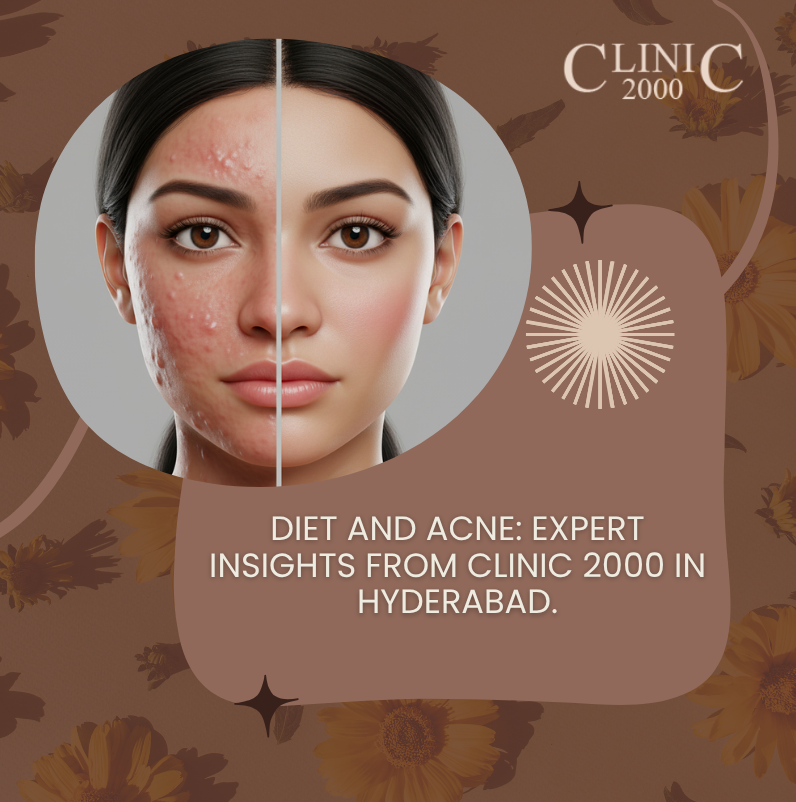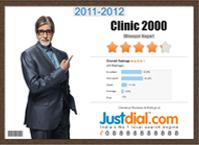
Acne affects countless people across Hyderabad, from teenagers in school to adults juggling work stress. While hormones and genetics have always been linked to acne, people often wonder how much food really influences breakouts. The Role of Diet in Acne is more important than most realize, and understanding it can make a major difference in how your skin behaves day to day. Clinic 2000 in Himayatnagar has been guiding patients through this connection with a blend of science, skincare, and nutrition.
Let’s break it down clearly so you can understand what helps, what harms, and what’s just hearsay.
Understanding Acne and Its Core Causes
Acne happens when pores get clogged with excess oil, bacteria, and dead skin cells. Hormonal changes, stress, genetics, and certain medications all play a part. But food choices can influence inflammation and oil production too. That’s where the Role of Diet in Acne comes in, what you eat can make your skin calmer or more reactive depending on your body’s sensitivity.
Here’s the thing: food might not create acne from scratch, but it can definitely affect how often breakouts happen and how severe they become.
Common Myths About Diet and Acne
Let’s clear up a few popular misunderstandings.
Myth 1: Greasy Foods Directly Cause Acne
It’s easy to blame fried food, but eating oily dishes doesn’t send oil straight to your pores. That said, greasy diets can increase inflammation in sensitive people, which may worsen breakouts indirectly.
Myth 2: Chocolate and Sugar Always Trigger Breakouts
Chocolate alone isn’t the enemy. The culprits are the sugar and dairy in milk chocolate. Some people break out after consuming sugary sweets or dairy products, while others don’t notice any link.
Myth 3: Diet Has No Role in Acne at All
This myth hangs around because acne has so many causes. But research shows that diet affects hormone levels, gut health, and inflammation—all of which play into acne severity.
Evidence-Based Facts About Diet and Acne
Now let’s walk through what the science actually supports.
Fact 1: Nutrient-Rich Foods Help Calm Acne
Vitamins A, C, E, zinc, and omega-3 fats strengthen the skin barrier and reduce inflammation. Foods like berries, spinach, nuts, seeds, salmon, and sweet potatoes give skin what it needs to heal faster.
Fact 2: Hydration and Gut Health Matter
Water helps flush toxins and keeps the skin’s natural barrier healthy. A balanced gut also reduces inflammation. Probiotic-rich foods like yogurt, kefir, kimchi, and other fermented foods help restore balance.
Fact 3: High-Glycemic Foods Can Trigger Breakouts
White rice, white bread, pastries, soda, and sweets spike insulin levels. High insulin boosts oil gland activity, which means clogged pores and more breakouts.
Clinic 2000’s Holistic Approach to Acne Management
Clinic 2000 combines dermatologist expertise with personalized nutrition because clearing acne involves more than just creams.
How Dermatologists at Clinic 2000 Evaluate Diet
Your eating habits, food triggers, hydration patterns, and digestion play a role. Dermatologists here help identify whether dairy, sugar, or high-carb foods might be worsening your breakouts.
Integrating Super Peel, Medications, and Nutrition
Treatments like the Super Peel, medical-grade skincare, and oral medications work even better when supported by a balanced diet. It’s a powerful combination that produces faster, long-lasting improvements.
Practical Dietary Tips for Clearer Skin
Here are simple changes that support acne recovery:
Foods to Limit
- Sugary snacks, desserts, white bread
- Excessive dairy (if it triggers you)
- Processed, packaged foods
Foods to Increase
- Omega-3 rich fish, walnuts, flaxseed
- Fresh fruits and vegetables
- Whole grains
- Plenty of water
- Probiotic foods for gut health
If you want deeper reading, the American Academy of Dermatology offers guidance on how diet influences acne.
Why Choose Clinic 2000 for Acne Treatment in Hyderabad?
Clinic 2000 in Himayatnagar brings together modern dermatology, advanced tools like the Super Peel, and personalized diet planning. Patients appreciate clear explanations, practical solutions, and visible skin improvements. This combination of medical expertise and lifestyle coaching lets you achieve clearer skin naturally and sustainably.
FAQs About Diet and Acne
1. Can eating junk food cause acne?
Not directly, but it can worsen inflammation and oil production in some people.
2. Does dairy trigger breakouts?
It can for some, especially skim milk, due to hormones and sugar content.
3. Can drinking water improve acne?
Hydration supports skin healing and toxin removal, helping acne indirectly.
4. Are spicy foods bad for acne?
Spice doesn’t cause acne, but it may trigger flushing for some.
5. Is chocolate safe to eat?
Dark chocolate with low sugar is generally safer than milk chocolate.
6. Can diet alone cure acne?
Diet helps but isn’t enough alone. Professional treatment speeds and strengthens results.
The Role of Diet in Acne is bigger than most people realize. Food might not cause acne by itself, but the right eating habits can support clearer, calmer skin. Clinic 2000 in Himayatnagar helps patients combine skincare, peels, medications, and smart nutrition to get lasting results.
If you’re ready to tackle acne from all angles, schedule a consultation today:
📞 9676231891 / 8978537720




